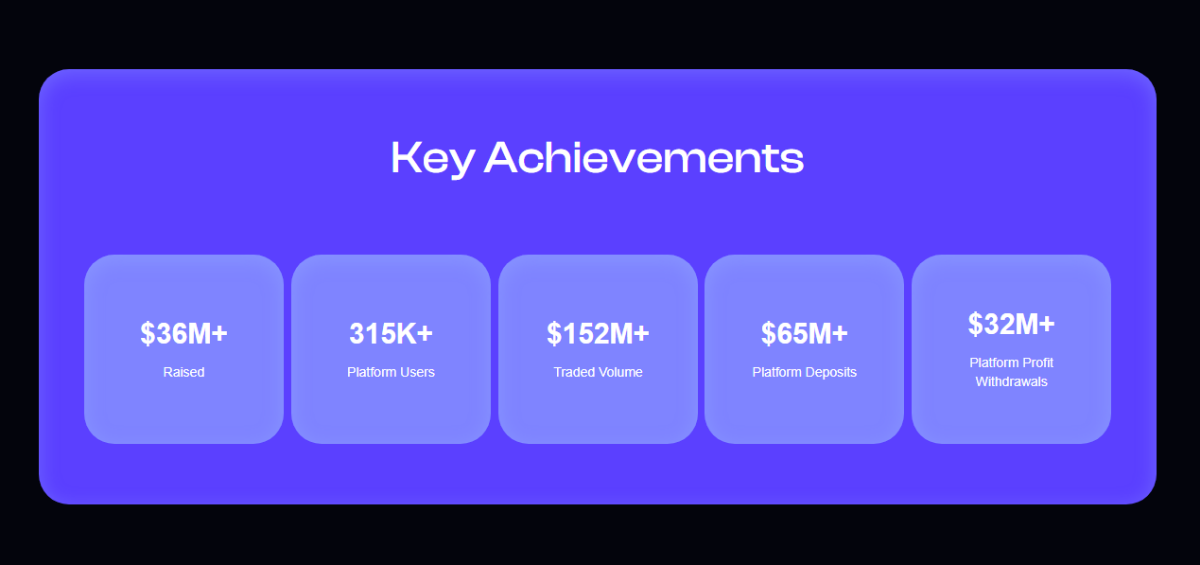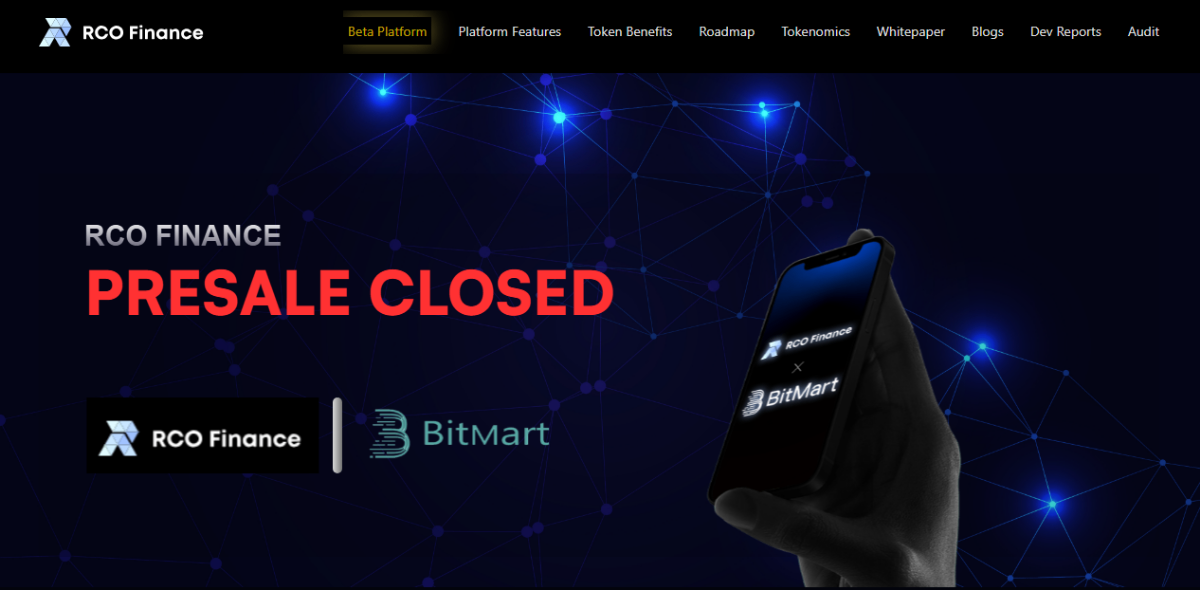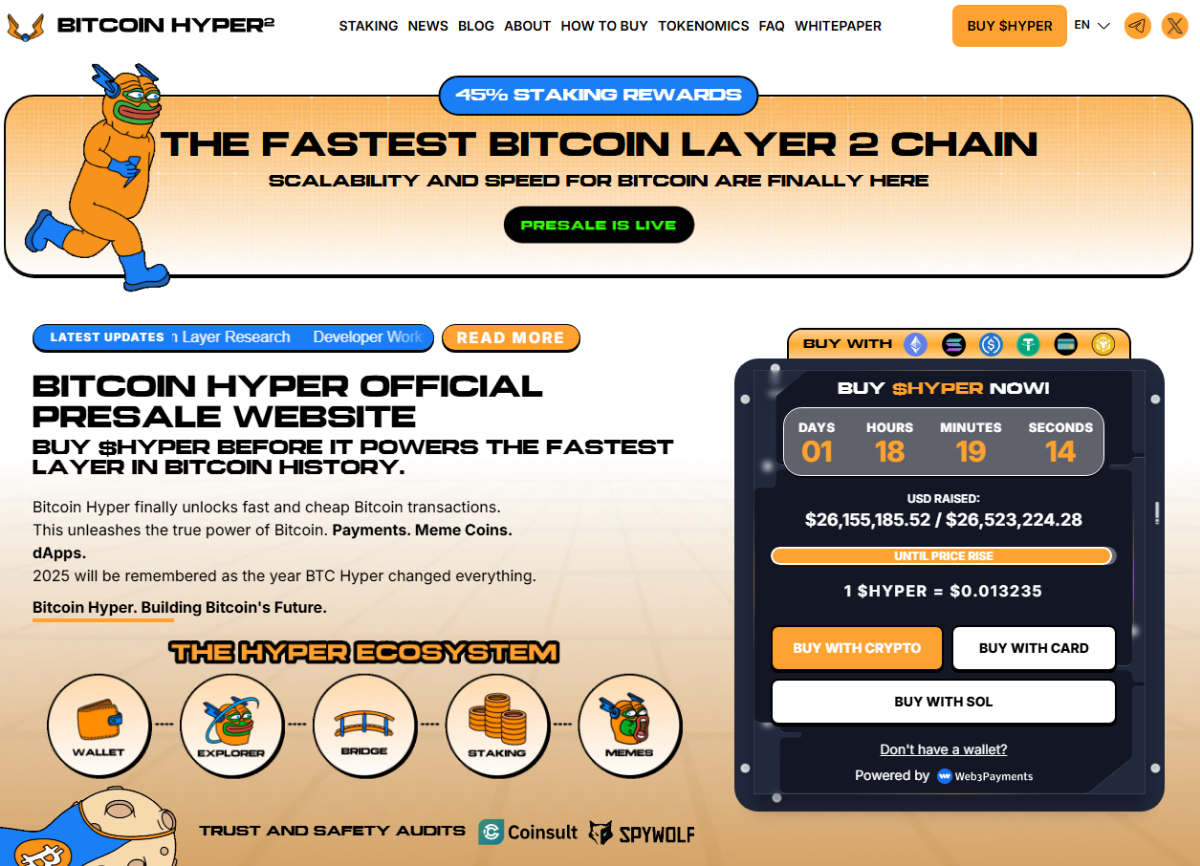LiquidChain is a Layer 3 blockchain project that wants to unify the liquidity of Bitcoin, Ethereum, and Solana into a single execu...
RCO Finance (RCOF) promised AI-powered investing and multi-asset DeFi tools, raising over $36 million in presale. But, with anonymous founders, missing tokens, and audit concerns, its growth is far from guaranteed. Here is what investors need to know.
RCO Finance (RCOF) was one of the most talked-about DeFi projects of 2024 and 2025. With its planned AI-powered investment tools, ambitious roadmap, and claims of bridging traditional finance with decentralized trading, it’s no surprise that investors are curious about its future price potential.
At a glance, it looks promising. The project says it raised over $36 million during its presale and has already secured a listing on BitMart. This gives it early visibility in the crypto market. However, when you look closer, this hype is mixed with controversy and uncertainty. While RCOF promises a next-generation ecosystem with staking rewards and robo advisors, questions remain about its transparency, team, and liquidity strength.
That being said, this post will attempt to answer a critical question for anyone watching the project: What could happen to the RCOF price in 2026 and beyond?
Featured Alternative – Editor’s Choice

- First Bitcoin Layer 2 enabling fast, low-cost transactions
- Fixes Bitcoin’s speed and fee limitations with near real-time performance
- Enables a Bitcoin-native DeFi ecosystem
Key Takeaways: RCOF Price Forecast
| Year | Bearish | Moderate | Bullish |
| 2026 | $0 | $0.0008 | $0.0050 |
| 2027 | $0 | $0.0030 | $0.0100 |
| 2030 | $0 | $0.0250 | $0.1000 |
- Tokenomics: The total supply of RCOF is 1.12 billion tokens. The allocation includes 50% for public sale, 20% for ecosystem development, and smaller shares to team/advisors/marketing.
- Audit and transparency concerns: The project claims to have audited smart contracts and KYC certificates, but reviews flag that contract owners have high control privileges, which is a major red flag.
- Utility vs. reality gap: Many features (zero gas trading, AI robo-advisor, DeFi card) are still in the roadmap and delayed stages. Listing on a major exchange did happen, but liquidity remains very weak.
- Risk environment: Strong presale hype combined with institutional claims and a big raise led to large expectations. But, lack of full delivery combined with weak liquidity and control privileges carries significant downside risk.
Detailed Price Prediction for RCO Finance 2026-2030
Let’s dig deeper into the three scenario bands for RCOF’s price in the following years.
2026: Short Term (Months after Listing and Immediate Market Reaction)
RCOF already completed its presale, raising a reported $36 million. In late 2025, it was listed on BitMart. At this point, an official SolidProof audit exists, but it highlights owner privileges and that only a single token contract was audited. Meanwhile, community reports have surfaced claiming that some presale participants didn’t receive their tokens (both on Trustpilot and Reddit).
Bearish ($0)
The worst realistic outcome for 2026 is complete value loss. If the token is delisted from exchanges and on-chain liquidity vanishes, or if trading is blocked by owner privileges (honeypot mechanics), this can happen. This is not uncommon for new crypto projects, but it would be unusual for a token with such a successful presale.
Also, if enough liquidity is pulled or if major CEXs and DEXs label the token dangerous, the market price can easily drop to zero. Seeing how RCOF was listed on Uniswap, but has since been marked as a potential honeypot, this is a possible scenario, though it might take some time for it to bottom out.
Bullish ($0.0050)
The bullish short-term outcome requires the rapid delivery of credibility signals. If the team addresses the audit findings and major exchanges confirm continued listing or increasing liquidity, this could happen. Also, people expect the platform to unveil a working beta of the AI robo-advisor or a strategic partner announcement soon. They also expect some of the promised token utilities, like staking and fee discounts, to begin to function.
If this happens and if market sentiment is positive, it can push short-term price spikes. Still, this is a highly bullish scenario and based on the token’s current liquidity, very unlikely to happen.
Moderate ($0.0008)
A moderate outcome for 2026 is the most realistic scenario right now. It assumes that the token survives listing but with weak liquidity and low retail trading, which is the situation right now. In this scenario, RCOF remains tradable on BitMart, and small DEX pools exist. Some users regain confidence after they get their tokens, and perhaps there are some minor fixes to the contracts.
2027: Medium Term (Product Maturity or Project Failure Window)
By 2027, the market will test whether RCO Finance turns its roadmap promises into a working product. If that execution is poor, the problems observed around the TGE will be magnified. On the other hand, if execution is strong, the token might just find real utility demand.
Bearish ($0)
If the project fails to deliver meaningful product features at this point, the token could become functionally worthless. Also, if regulatory scrutiny escalates (MiCA or regional reinforcement), or exchanges delist RCOF due to fraud reports, the future doesn’t seem bright for this token.
The owner privileges flagged in the audit included a technical mechanism that can convert product failure into financial ruin for the holders. For instance, the owner may be able to drain liquidity or introduce massive fees.
Finally, ongoing unresolved user complaints and evidence of missing presale distributions at this point will most likely result in enforcement actions and maybe even mass lawsuits. This could also dramatically impair its market value.
Bullish ($0.0100)
In a very positive scenario, the token could have multiple positive outcomes by 2027. If the team fixes the audit-flagged issues and the AI advisory product proves effective and attracts users, the platform could thrive.
For this to happen, the platform would also need to launch revenue-sharing dividends and begin to generate measurable revenue. In addition to the current listing, it should have major CEX listings and deeper DEX liquidity to start thriving.
Note that this requires many changes and flawless execution. A trust repair is a high bar given the situation with the project right now.
Moderate ($0.0030)
The moderate 2027 path assumes RCO Finance manages to build some core utility (a usable AI-driven portfolio product and modest user growth, for instance). The token’s utility (staking, fee discounts, and governance) should be proven for this to happen.
Under this scenario, the presale drama fades as the platform demonstrates recurring revenue in audits, as well as becomes more transparent.
2030: Long Term (Survivor vs Winner-Takes Most)
Over a 5-year horizon, the market will have separated projects that delivered real utility from those that were a scam or a presale hype.
Bearish ($0)
If things go wrong, RCOF could still end up worthless by 2030. This happens when a project never moves past the early hype or fails to deliver real products and user adoption. We have seen hundreds of tokens crash to zero after rug pulls or legal troubles, or because their teams simply disappeared.
If RCO Finance doesn’t build a sustainable business, and if presale investors sell heavily soon, the price could realistically fall – and stay at or near zero. Zero is an honest bearish floor for many high-risk projects in the long term, but it is even more likely for projects with poor reputations early on.
Bullish ($0.1000)
For RCOF to reach 10 cents or more, it would likely require a perfect storm of positive factors. The project would have to become one of the leaders in AI-driven trading, with hundreds of thousands of active users and solid income streams. We are talking about real token demand through staking and maybe token burns, plus strong transparency and excellent audits.
If RCO Finance can pull this off and regain investor trust after its rocky start, the token could climb much higher. Still, this outcome seems very unlikely at the moment.
Moderate ($0.0250)
In a more balanced scenario, RCO Finance could survive and grow into a small, yet active DeFi platform. By 2030, it might have a solid AI advisory tool that attracts a stable user base and generates real revenue from trading and subscriptions.
If the team becomes more transparent and keeps improving the platform, it could build trust over time.
What Is RCO Finance?
RCO Finance (RCOF) is a new decentralized finance (DeFi) project that promises to merge artificial intelligence, traditional finance, and crypto trading tools into one ecosystem. It launched with big claims and even bigger ambitions, though its reputation on the market has been tarnished since.

RCO Finance project description. Source: RCO Finance
At its core, RCO Finance aims to become a multi-asset trading hub powered by AI. The idea is to let users trade cryptocurrencies, as well as stocks, ETFs, commodities, and tokenized real-world assets (RWAs). They promise to facilitate all this through a single interface, with zero gas fees and AI-powered tools to assist users.
The $RCOF Token
The platform’s native token, $RCOF, plays a central role in the ecosystem. It is supposed to offer:
- Staking rewards and passive income opportunities
- Reduced trading fees for token holders
- Access to premium AI investment tools
- Participation in governance and liquidity pools
The total supply of $RCOF is 1.124 billion tokens, with 50% allocated to public sale, 4% to the team, and 20% for ecosystem development. There is also a 1% buy tax and 4% sell tax, which fund the project’s ecosystem.
Why Are Investors Watching RCO Finance?
Before the controversies, RCO Finance caught the attention of many investors. Its pitch is bold, combining cross-market access, zero gas trading, and AI-driven investing, all wrapped in a sleek DeFi package. Some of the reasons why this presale has gained so much attention include:
Huge Promises in an Exciting Industry
AI is one of the most talked-about technologies in crypto right now. By positioning itself as an AI-powered DeFi platform, RCO Finance taps into a fast-growing narrative.
Massive Presale Success
The project raised over $36 million during its presale, which is a big amount for a new DeFi token. This level of fundraising sparks curiosity on its own, as it shows strong early demand.

RCO Finance’s claimed achievements. Source: RCO Finance
Intersection of DeFi and TradFi
If the platform can really deliver on its promises to integrate stocks, ETFs, and real-world assets alongside crypto trading, it would stand out in a crowded DeFi market.
BitMart Listing
RCOF being listed on BitMart, a recognized centralized exchange, adds a layer of visibility and allows trading outside of decentralized platforms.

RCO Finance homepage. Source: RCO Finance
Deflationary Tokenomics
The buyback and burn mechanism and staking rewards could theoretically support long-term value if the platform gains traction.
Risks from Investing in RCO Finance
RCO Finance might look promising on the surface, but there are several serious risks to consider before you invest. Some are common in early-stage crypto projects, but others are specific to RCOF’s structure and history.
Anonymous Team
The team behind RCO Finance remains undisclosed, with no verified LinkedIn profiles or proof of identity. Even though the project mentions a KYC process, no public certificate has been shared. Anonymous teams often raise red flags because they make accountability nearly impossible, though not all anonymous projects are scams by any means.
Presale Issues and Missing Tokens
Multiple users online have claimed they never received tokens after participating in the presale. Some also reported being unable to get refunds. These reports are worrying, especially after such a large fundraising round.
High Contract Control
The SolidProof audit revealed that the contract owner can change fees, exclude wallets, and control tax collection. This gives the founders an extraordinary amount of power over the token, which could potentially be misused for profit.
Honeypot Warning on Uniswap
When RCOF appeared on Uniswap, the decentralized exchange flagged it as a potential honeypot, which means that users might be able to buy the token but not sell it. While the token is tradable on BitMart, this flag adds another layer of concern about how secure the smart contract really is.
Overpromised Features
Many of RCO Finance’s most exciting features, such as AI robo-advisors, multi-asset access, and DeFi debit cards, are not yet available. Until these features are live and functional, the project remains mostly theoretical.
Weak Liquidity
Although RCOF is listed on BitMart, the trading volume is still low. Limited liquidity means it is harder for investors to buy or sell large amounts of tokens without affecting the price significantly.
Featured Alternative – Editor’s Choice

- Degen meme coin inspired by max-leverage trading
- A tribute to high-risk hustle — fueled by sweat and conviction
- Ethereum-born, culture-driven, aiming for multichain
How RCO Finance Compares to Other Presales
When you are trying to estimate potential price moves for RCOF, it also helps to compare it with other new crypto projects. Let’s make a comparison with a few selected tokens.
Bitcoin Hyper
Bitcoin Hyper is a viral presale project that aims to build a Layer 2 for Bitcoin using the Solana Virtual Machine to deliver faster transactions, lower fees, and massively expanded utility. So far, it has raised over $24 million and remains in its presale.

Bitcoin Hyper presale homepage. Source: Bitcoin Hyper
How it’s similar to RCOF:
- Big presale raise
- Ambitious tech narrative (AI or next-gen layer)
- Early-stage listing and presale focus
Even though it is somewhat similar, Bitcoin Hyper looks much more promising. It has a clearer technical focus (L2 scaling Bitcoin) rather than multiple broad promises. It has more visible fundraising transparency and media coverage of its presale milestones, and it has passed independent audits with no major concerns, unlike RCOF.
Conclusion: Is RCO Finance Going to Grow in Value?
RCO Finance is an ambitious project with a bold promise: to combine AI, DeFi, and traditional financial assets into one platform. Its presale raised a significant $36 million, and the token is now listed on BitMart, giving it some legitimacy.
However, there are several factors that make its growth uncertain. For starters, the team is anonymous with no verifiable credentials. Also, many of the promised features are still in development, and liquidity is low.
Most importantly, the project has been flagged for high owner control, potential risks of a honeypot, and there have been reports of missing presale tokens.
Given these issues, the most likely scenario right now is that RCOF will struggle to maintain value unless the team makes major changes soon. Even if some features eventually launch, the market may not reward the token aggressively due to a lack of trust and prior presale controversies.
FAQ
Is RCOF a legitimate project?
Has RCOF been audited?
Can I buy RCOF now?
What are the main risks from investing in RCOF?
Could RCOF go to zero?
References
- Smart Contract Audit of RCOF – SolidProof Audit
- Reviews about RCOF on Trustpilot – Trustpilot
- Reddit Conversation about RCO Finance – Reddit
- Honeypot Scams in Crypto – CertiK Blog
- Understanding Market Sentiment: What It Is, and How Does It Affect Prices – Gemini
- What Is a Token Generation Event – CoinMarketCap
- What Is Market in Crypto Assets (MiCA) – Investopedia
- Real-World Assets (RWAs) Explained – Chainlink
Coinspeaker in Numbers
Monthly Users
Articles & Guides
Research Hours
Authors
The team behind IPO Genie has not yet announced an end date for the presale.
AI cryptocurrencies combine blockchain with artificial intelligence to power decentralized machine learning networks, GPU computin...
 Fact-Checked by:
Fact-Checked by:
 14 mins
14 mins
Nadica Metuleva
, 47 postsI’m a seasoned writer with over a decade of professional experience, specializing in crypto, technology, business, and iGaming. Over the years, I’ve built a reputation as a trusted contributor to well-known outlets such as InsideBitcoins, CEOTodayMagazine, and Promo, while also collaborating with leading content and marketing agencies including Skale and Boosta. My portfolio spans a wide range of content types, exchange reviews, how-to guides, long-form comparisons, trend analyses, and thought leadership pieces, crafted to both inform and engage readers across different levels of expertise.
In the crypto space, I’ve developed a deep understanding of blockchain technology, digital assets, and the fast-moving decentralized finance (DeFi) ecosystem. I’ve written extensively on topics such as cryptocurrency exchanges, wallets, tokenomics, NFTs, and global regulatory developments. As a crypto investor myself, I bring a valuable firsthand perspective that allows me to balance technical accuracy with practical insights that resonate with traders, investors, and newcomers alike. Whether I’m breaking down blockchain mechanics or analyzing the latest market shifts, my work combines rigorous research, industry knowledge, and a keen sense of storytelling.
My educational background plays a key role in shaping my writing approach. I hold a Bachelor’s degree in Translation and a Master’s degree in English Literature and Teaching, disciplines that sharpened my ability to research complex subjects, distill technical information into accessible language, and adapt my tone to diverse audiences. This strong academic foundation underpins my clear, insightful, and authoritative style.
Passionate about making complex topics accessible, my mission is to cut through the jargon and deliver content that empowers readers to make informed decisions.
You can learn more about me and explore my portfolio on LinkedIn.